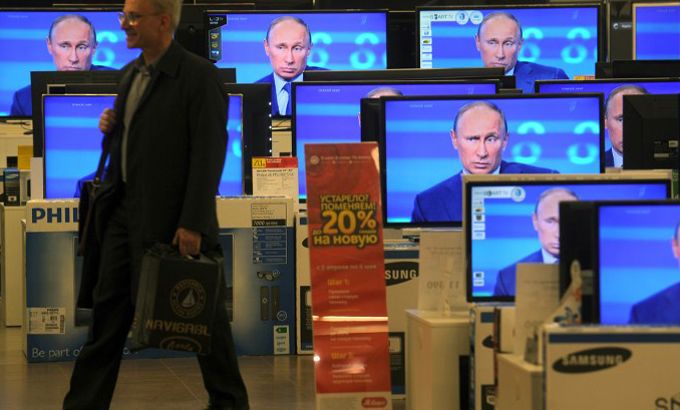Putin fields questions during annual phone-in
President tackles issues including Stalinism, Boston bombings and economics in first few hours of annual live phone-in.

Vladimir Putin, the Russian president, has begun his first nationwide phone-in with Russians since returning to the Kremlin for a third term to answer wide-ranging questions for several hours.
The event on Thursday is being broadcast by several state television channels which tirelessly promoted it in advance. It may not finish until the early evening.
Early in the session, President Putin jokingly called former Finance Minister Alexei Kudrin a “slacker” for refusing to rejoin his government, as the two jousted on live television over how to revive a weakening economy.
“I offered – he refused,” Putin told the live call-in show after Kudrin took the microphone to criticise his administration’s economic policies. Smiling, Putin added: “He’s a slacker and doesn’t want to work.”
I do not see any elements of Stalinism here. Stalinism is linked to the cult of personality, mass violations of the law, repressions and camps
The good-natured exchange indicated that, although Putin remains on good personal terms with Kudrin, who served as finance minister for 11 years before resigning in September 2011, their economic views remain far apart.
He also said the Boston bombings showed the need for Russia and the United States to work more closely on security matters and proved his policy on the restive North Caucasus region was correct.
“If we truly join our efforts, we will not allow these strikes and suffer such losses,” he said.
Later, Putin denied the existence of any elements of Stalinism under his rule but warned there needed to be “order and discipline” in modern Russia.
“I do not see any elements of Stalinism here,” Putin said. “Stalinism is linked to the cult of personality, mass violations of the law, repressions and camps … [But] this does not mean that we should not have order and discipline.”
Russia is going through a critical moment in its post-Soviet development, with society seeing unprecedented change, but the Kremlin hitting back with tough laws and the economy also starting to show troubling signs of weakness.
Provocative and controversial
By Wednesday afternoon, Russians had already posed 1.2 million questions for Putin through call-centres, SMS messages and the internet, the organisers said in a statement quoted by Russian news agencies.
Much of the phone-in is still likely to be dominated by bread-and-butter issues, with Russians worried by the slowdown in the economy, which saw growth of only 1.1 percent in the first quarter.
The protest movement has lost momentum since it began in the wake of December 2011’s controversial parliamentary elections. But the Kremlin is acutely aware of the potential political risks if the economy starts to suffer.
The question-and-answer session is known as a forum where Putin has made some of his most provocative and controversial comments.
During the December 2011 phone-in, which took place just after the first mass protests of his rule had shaken the authorities, Putin compared the white ribbons worn by the demonstrators to condoms.